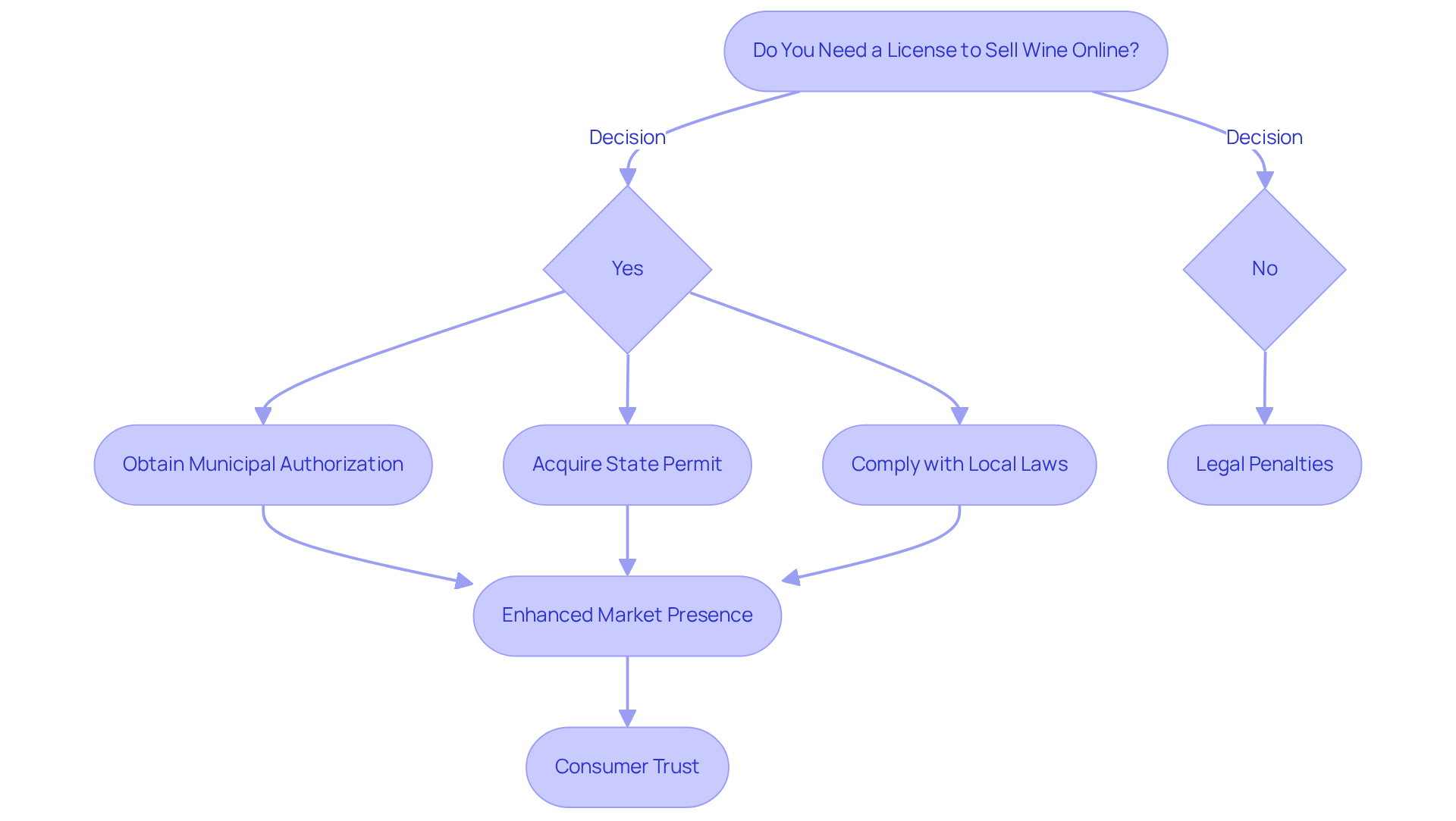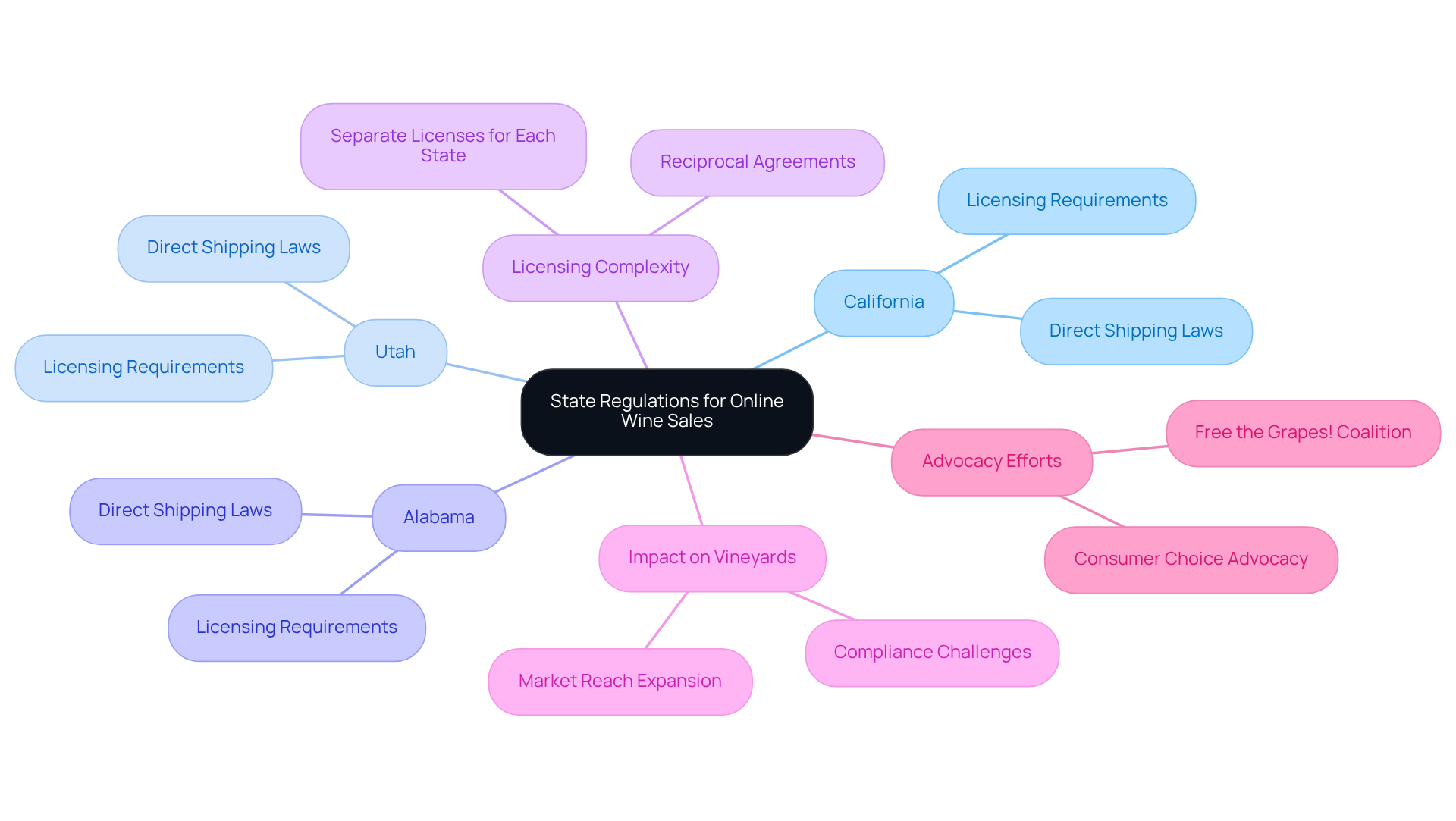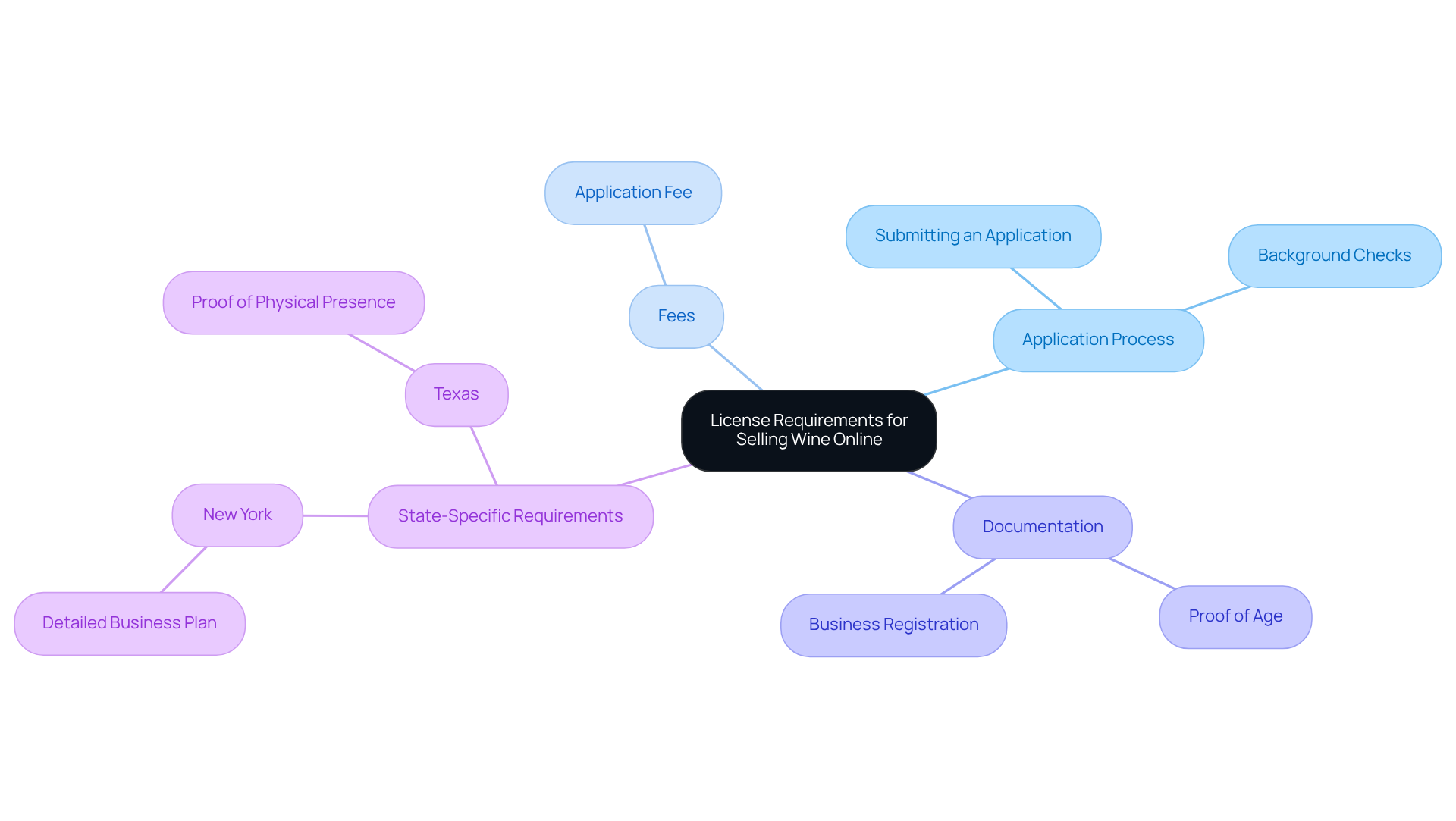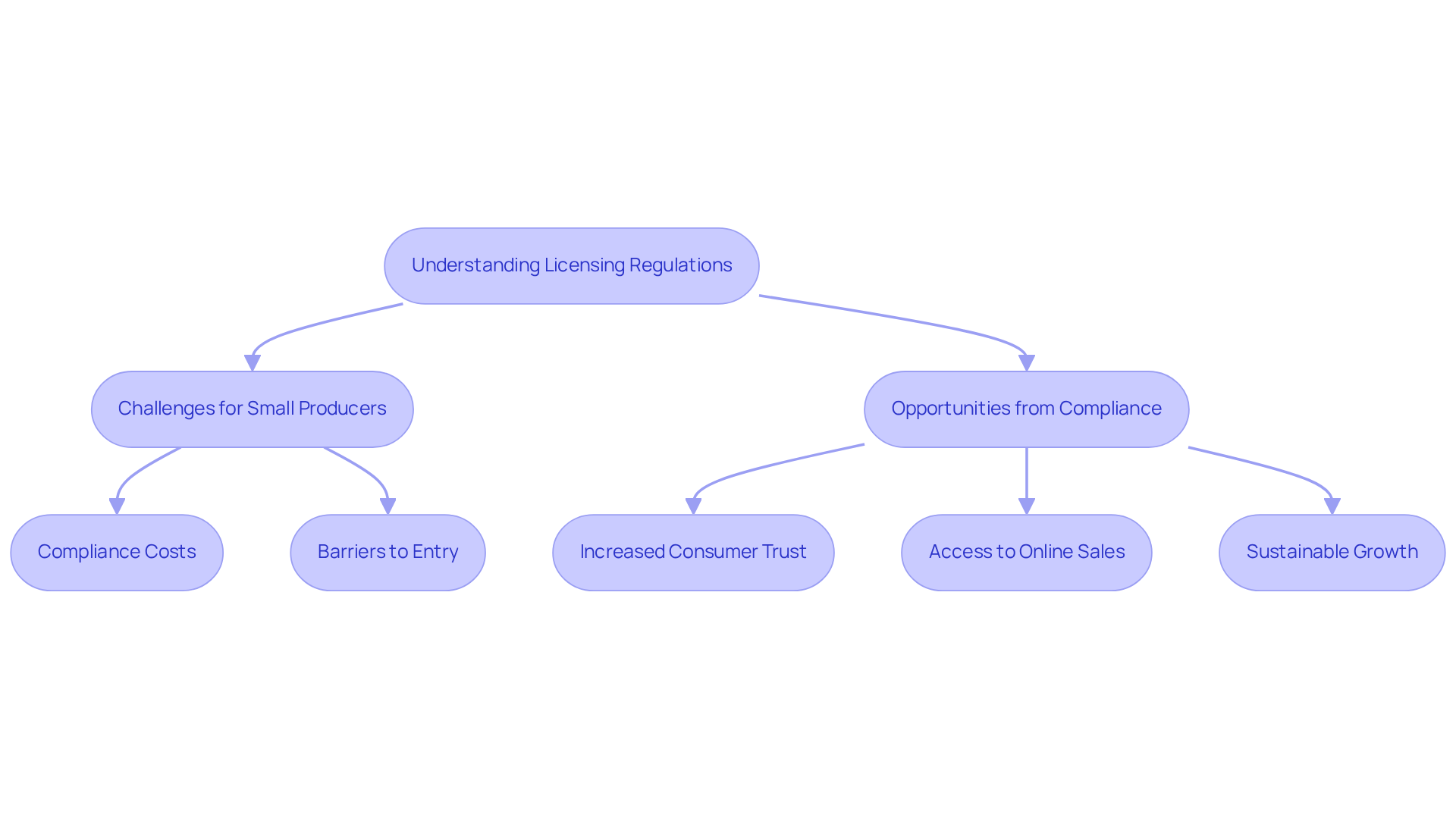Overview
Selling wine online necessitates a license, with regulations differing significantly by state. Wineries must secure various permits to adhere to local laws. Understanding these licensing requirements is crucial for family-owned vineyards. Navigating the complex regulatory landscape not only enhances market access but also builds consumer trust, ultimately supporting growth in the digital marketplace.
Introduction
Navigating the world of online wine sales presents a significant challenge for family-owned vineyards, particularly when grappling with the intricate licensing requirements that differ from state to state. As the digital marketplace expands, understanding whether a license is necessary to sell wine online becomes increasingly vital, unveiling both opportunities and challenges for those eager to enter this lucrative market. With notable variations in regulations across the United States, how can smaller wineries ensure compliance while maximizing their reach and profitability? This article explores the essential licensing landscape, offering insights designed to empower vineyards to flourish in an ever-evolving industry.
Understanding the Need for a License to Sell Wine Online
When considering selling wine online, you might wonder, do you need a , as it necessitates strict adherence to state-specific regulations that typically require wineries to obtain various permits. These permits are crucial for ensuring that the sale and distribution of alcohol align with local laws, which can differ significantly across regions.
For instance, municipalities grant authorizations, while the state issues permits, underscoring the complexity of the regulatory landscape. Operating without the necessary licenses exposes businesses to substantial legal penalties, including significant fines and the potential cessation of their digital sales operations. Notably, the processing time for a special permit can extend up to 10 business days, making it vital for vineyards to plan accordingly.
For family-operated vineyards seeking to capitalize on the burgeoning digital market, it is imperative to understand, do you need a licence to sell wine online? This knowledge not only protects their business but also cultivates consumer trust in their brand.
Successful family-operated vineyards that have adeptly navigated these regulations often report enhanced market presence and customer loyalty, highlighting the critical role of compliance in establishing a sustainable sales strategy. By securing the appropriate licenses, wineries can unlock direct-to-consumer revenue opportunities and lay the foundation for long-term growth, supported by strategic capital planning and effective brand storytelling.

Comparing State Regulations for Online Wine Sales
When considering regional regulations governing internet wine sales, it is important to ask, , as there are significant disparities, with some areas permitting direct-to-consumer shipping while others impose stringent limitations. For instance, California's laws are relatively accommodating, facilitating more efficient online sales processes. In contrast, states like Utah and Alabama enforce rigorous regulations that complicate shipping logistics for vineyards. Moreover, many states mandate that vineyards secure a separate license for each state they intend to ship to, leading to the question: do you need a licence to sell wine online, while others have established reciprocal agreements that streamline the licensing process.
This complexity is further highlighted by findings from a recent case study on direct shipping laws, underscoring the diverse regulatory landscape throughout the United States. As family-operated vineyards strive to expand their market reach, understanding do you need a licence to sell wine online becomes essential for navigating interstate commerce effectively. Enocap's strategic capital advisory services, which include tailored debt, equity, and acquisition solutions, can assist businesses in complying with these regulations while unlocking growth opportunities. Staying informed about state-specific laws is vital for maintaining operational integrity and optimizing market potential. Periodic alerts keep wineries updated on compliance requirements, ensuring they remain aware of any changes. The advocacy efforts of the 'Free the Grapes!' coalition further underscore the significance of consumer choice in fine wine, adding depth to the discussion surrounding direct shipping laws.

Key Requirements for Obtaining a License in Different States
When considering selling wine online, one must ask, do you need a licence to sell wine online, as acquiring a permit is a critical step for any vineyard and typically involves several important procedures that may differ by region. Common requirements include:
- Submitting an application
- Paying a fee
- Providing documentation such as proof of age and business registration
In certain regions, background checks for owners or essential staff may also be necessary. For example, New York requires vineyards to submit a detailed business plan alongside their application, while Texas mandates proof of a physical presence in the state. Understanding these requirements is essential for to ensure compliance with all legal obligations, including whether do you need a licence to sell wine online before initiating online sales.
Enocap stands ready to assist vineyards in navigating these complex licensing requirements. Our expertise in developing effective direct-to-consumer strategies can transform casual buyers into loyal club members through tailored advisory services. Are you prepared to take your online sales to the next level? Let us guide you through the process, ensuring that you not only meet all necessary regulations but also thrive in the competitive online marketplace.

Implications of Licensing Regulations for Family-Owned Wineries
Understanding is essential, especially when considering do you need a licence to sell wine online, as they shape market access and operational efficiency for family-owned vineyards. For smaller wine producers, compliance often presents significant barriers to entry, hindering their ability to compete against larger, established brands. The financial burden of obtaining and maintaining licenses strains the limited resources of these family-run operations. Industry insights reveal that many small vineyards identify navigating the complex landscape of licensing as one of their top challenges, with compliance costs consuming a substantial portion of their budgets.
However, establishments that successfully navigate these regulatory hurdles can reap considerable rewards. By adhering to licensing requirements, they not only bolster consumer trust and loyalty but also gain access to a wider audience through internet sales channels. For example, vineyards that invest in understanding their local and state regulations have reported a marked increase in online sales, demonstrating that compliance can lead to sustainable growth.
Ultimately, a thorough understanding of licensing requirements, such as do you need a licence to sell wine online, is essential for the long-term success of family-owned wineries in the digital marketplace. As the industry evolves, those who adapt to these regulations will be better positioned to thrive in an increasingly competitive environment.

Conclusion
Navigating the complexities of selling wine online necessitates a profound understanding of licensing requirements, which vary significantly from state to state. Securing the appropriate licenses is not merely a legal formality; it is a fundamental aspect that can determine the success and sustainability of family-owned vineyards in the digital marketplace. By comprehending the nuances of these regulations, wineries can protect their operations, foster consumer trust, and unlock new revenue streams.
Key insights from the article underscore the critical importance of compliance with state-specific laws, the challenges encountered by smaller wineries, and the potential benefits of adhering to licensing requirements. Family-operated vineyards that invest time and resources into understanding their local regulations are often better positioned to compete and thrive. The case studies and examples illustrate that successful navigation of these licensing landscapes leads to increased market presence and customer loyalty.
Ultimately, the message is unequivocal: understanding and complying with licensing regulations is essential for any vineyard aiming to sell wine online. As the industry continues to evolve, staying informed about legal requirements and leveraging expert advisory services can empower wineries to not only meet compliance standards but also capitalize on the growth opportunities that the online marketplace presents. Embracing this knowledge will pave the way for long-term success in a competitive environment, ensuring that family-owned wineries can flourish in the digital age.
Frequently Asked Questions
Do I need a license to sell wine online?
Yes, you need a license to sell wine online as it requires adherence to state-specific regulations that typically mandate various permits.
What kind of permits are necessary for selling wine online?
Wineries must obtain permits from municipalities and the state, which are essential for ensuring compliance with local laws regarding the sale and distribution of alcohol.
What are the consequences of operating without the necessary licenses?
Operating without the required licenses can lead to substantial legal penalties, including significant fines and the potential cessation of digital sales operations.
How long does it take to process a special permit for selling wine online?
The processing time for a special permit can extend up to 10 business days, so it is important for vineyards to plan accordingly.
Why is understanding the licensing requirements important for family-operated vineyards?
Understanding the licensing requirements is crucial for family-operated vineyards as it protects their business and helps build consumer trust in their brand.
What benefits do successful vineyards experience by navigating these regulations?
Successful vineyards that comply with regulations often report enhanced market presence and customer loyalty, which are critical for establishing a sustainable sales strategy.
How can securing the appropriate licenses impact a winery’s growth?
By securing the appropriate licenses, wineries can unlock direct-to-consumer revenue opportunities and lay the foundation for long-term growth, supported by strategic capital planning and effective brand storytelling.




